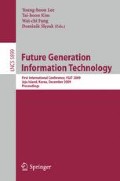Abstract
Regression testing is a critical activity which occurs during the maintenance stage of the software lifecycle. However, it requires large amounts of test cases to assure the attainment of a certain degree of quality. As a result, test suite sizes may grow significantly. To address this issue, Test Suite Reduction techniques have been proposed. However, suite size reduction may lead to significant loss of fault detection efficacy. To deal with this problem, a greedy algorithm is presented in this paper. This algorithm attempts to select a test case which satisfies the maximum number of testing requirements while having minimum overlap in requirements coverage with other test cases. In order to evaluate the proposed algorithm, experiments have been conducted on the Siemens suite and the Space program. The results demonstrate the effectiveness of the proposed algorithm by retaining the fault detection capability of the suites while achieving significant suite size reduction.
Access this chapter
Tax calculation will be finalised at checkout
Purchases are for personal use only
Preview
Unable to display preview. Download preview PDF.
References
Rothermel, G., Harrold, M.J., von Ronne, J., Hong, C.: Empirical Studies of Test-Suite Reduction. Journal of Software Testing, Verification, and Reliability 12(4), 219–249 (2002)
Rothermel, G., Harrold, M.J., Ostrin, J., Hong, C.: An Empirical Study of the Effects of Minimization on the Fault Detection Capabilities of Test Suites. In: Proceedings of the International Conference on Software Maintenance. IEEE Computer Society, Los Alamitos (1998)
Harrold, M.J., Gupta, R., Soffa, M.L.: A methodology for controlling the size of a test suite. ACM Trans. Softw. Eng. Methodol. 2, 270–285 (1993)
Chen, T.Y., Lau, M.F.: Heuristics toward the Optimization of the Size of a Test Suite. In: Proc. 3rd Int’l. Conf. on Softw. Quality Management, Seville, Spain, April 1995, vol. 2, pp. 415–424 (1995)
Jones, J.A., Harrold, M.J.: Test-Suite Reduction and Prioritization for Modified Condition/Decision Coverage. IEEE Trans. Softw. Eng. 29, 195–209 (2003)
McMaster, S., Memon, A.: Call-Stack Coverage for GUI Test Suite Reduction. IEEE Trans. Softw. Eng. 34, 99–115 (2008)
Tallam, S., Gupta, N.: A concept analysis inspired greedy algorithm for test suite minimization. In: Proceedings of the 6th ACM SIGPLAN-SIGSOFT workshop on Program analysis for software tools and engineering. ACM, Lisbon (2005)
Leon, D., Podgurski, A.: A Comparison of Coverage-Based and Distribution-Based Techniques for Filtering and Prioritizing Test Cases. In: Proceedings of the 14th International Symposium on Software Reliability Engineering. IEEE Computer Society, Los Alamitos (2003)
Chen, Z., Xu, B., Zhang, X., Nie, C.: A novel approach for test suite reduction based on requirement relation contraction. In: Proceedings of the 2008 ACM symposium on applied computing. ACM, Fortaleza (2008)
Zhong, H., Zhang, L., Mei, H.: An experimental study of four typical test suite reduction techniques. Inf. Softw. Technol. 50, 534–546 (2008)
Chen, T.Y., Lau, M.: A new heuristic for test suite reduction. Information and Software Technology 40(5-6) (1998)
Wong, W.E., Horgan, J.R., London, S., Mathur, A.P.: Effect of test set minimization on fault detection effectiveness. Softw. Pract. Exper. 28, 347–369 (1998)
Mansour, N., El-Fakih, K.: Simulated annealing and genetic algorithms for optimal regression testing. Journal of Software Maintenance 11, 19–34 (1999)
Black, J., Melachrinoudis, E., Kaeli, D.: Bi-Criteria Models for All-Uses Test Suite Reduction. In: Proceedings of the 26th International Conference on Software Engineering. IEEE Computer Society, Los Alamitos (2004)
Rothermel, G., Elbaum, S., Kinneer, A., Do, H.: Software-artifact infrastructure repository, http://www.cse.unl.edu/~galileo/sir
SAS 9.1.3 Documentation, SAS/GRAPH 9.1 Reference, http://support.sas.com/documentation/onlinedoc/91pdf/index_913.html
Freund, J.E.: Mathematical Statistics, 5th edn. Prentice-Hall, Englewood Cliffs (1992)
Author information
Authors and Affiliations
Editor information
Editors and Affiliations
Rights and permissions
Copyright information
© 2009 Springer-Verlag Berlin Heidelberg
About this paper
Cite this paper
Parsa, S., Khalilian, A. (2009). A Bi-objective Model Inspired Greedy Algorithm for Test Suite Minimization. In: Lee, Yh., Kim, Th., Fang, Wc., Ślęzak, D. (eds) Future Generation Information Technology. FGIT 2009. Lecture Notes in Computer Science, vol 5899. Springer, Berlin, Heidelberg. https://doi.org/10.1007/978-3-642-10509-8_24
Download citation
DOI: https://doi.org/10.1007/978-3-642-10509-8_24
Publisher Name: Springer, Berlin, Heidelberg
Print ISBN: 978-3-642-10508-1
Online ISBN: 978-3-642-10509-8
eBook Packages: Computer ScienceComputer Science (R0)

